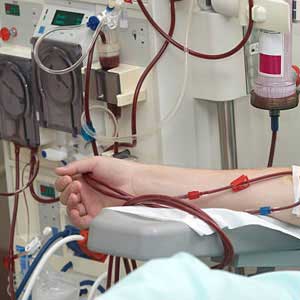Hemodialysis hospitals in Vijayawada
What is hemodialysis?
Hemodialysis in Vijayawada is the procedure in which the dialysis machine and special filter known as artificial kidney or dialyzer are utilized to clean the blood. The best doctor for dialysis in AP at hemodialysis centers in Vijayawada needs to make an access or entrance into the blood vessels so that the blood gets into the dialyzer. This is performed with minor procedure usually into your arm.
It can be done in the hospital or in a dialysis center in AP which is not a part of hospital or also at home. Based on your medical condition, the doctor will decide which place is the best.
Why is it done?
The doctor will help determine when to start the hemodialysis depending on several factors that includes:
- Overall health
- Signs and symptoms
- Kidney function
- Quality of life
- Personal preferences
Visit kidney hospitals in Vijayawada.
The procedure
During the treatment, you sit or lean back in a chair while your blood flows through the dialyzer, a filter that acts as an artificial kidney to clean your blood. You can utilize a time to watch television or a movie, read, rest, or maybe converse with your "neighbors" at the center. If you get hemodialysis at night time, you can sleep during the procedure.

- Preparation: Your weight, BP, heartbeat and temperature are checked. The skin covering your access site, the point where blood leaves and afterward reenters your body during treatment is cleansed.
- Starting: During hemodialysis, two needles are placed into your arm through the access site and taped set up to stay secure. Each needle is attached to a flexible plastic tube that interfaces with a dialyzer. Through one tube, the dialyzer filters your blood a couple of ounces at a time, permitting wastes and extra fluids to pass from your blood into a cleansing fluid called dialysate. The filtered blood gets back to your body through the second tube.
- Symptoms: You might encounter nausea and stomach cramps as too much of fluid is pulled from your body — particularly if you have gained a significant amount of fluid in between dialysis sessions. If you feel uncomfortable during the procedure, get some information about limiting side effects by such measures as adjusting the speed of your hemodialysis, your medication or your hemodialysis fluids.
- Monitoring: Since blood pressure and heart rate can vary as excess fluid is drawn from your body, your blood pressure and heart rate will be checked number of times during every treatment.
- Finishing: At the point when hemodialysis is finished, the needles are eliminated from your access site and a pressure dressing is applied to the site to prevent bleeding. Your weight might be recorded once again. Then you're free to go about your usual activities until your next session.
Dr. M. V. Sai Krishna is the best nephrologist in Vijayawada who strives in enhancing the quality of life. He uses the unique expertise in providing care that leads to the best outcome for the patient. Visit Dr. MV Sai Krishna the top Nephrologist at Sunrise Kidney Centre offering Urinary Infections treatment in Vijayawada
Frequently encountered myths on hemodialysis
Myth: Hemodialysis is a painful process.
Reality: While some patients may experience discomfort during dialysis, it's not always painful.
Myth: Hemodialysis is only for elderly patients.
Reality: Hemodialysis is used to treat patients of all ages, including children and young adults.
Myth: Hemodialysis is a cure for kidney disease.
Reality: Hemodialysis is a treatment, not a cure, and it's often used as a bridge to kidney transplantation.
Myth: Hemodialysis is only for patients with end-stage renal disease (ESRD).
Reality: Hemodialysis can be used to treat patients with acute kidney injury or chronic kidney disease.
Myth: Hemodialysis machines are unreliable.
Reality: Modern hemodialysis machines are highly reliable and accurate, with built-in safety features to ensure patient safety.
Myth: Hemodialysis patients can't travel.
Reality: With proper planning and arrangements, hemodialysis patients can travel safely and comfortably.
Myth: Hemodialysis patients are limited in their lifestyle choices.
Reality: Many hemodialysis patients lead active, normal lives, with some even engaging in high-intensity activities like sports.
Myth: Hemodialysis is expensive.
Reality: While the cost of hemodialysis can be high, many patients are eligible for Medicare coverage or other forms of financial assistance.

